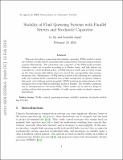Stability of Fluid Queueing Systems with Parallel Servers and Stochastic Capacities
Author(s)
Jin, Li; Amin, Saurabh
Download1604.02008.pdf (477.4Kb)
OPEN_ACCESS_POLICY
Open Access Policy
Creative Commons Attribution-Noncommercial-Share Alike
Terms of use
Metadata
Show full item recordAbstract
IEEE This article introduces a Piecewise-Deterministic Queueing (PDQ) model to study the stability of traffic queues in parallel-link transportation systems facing stochastic capacity fluctuations. The saturation rate (capacity) of the PDQ model switches between a finite set of modes according to a Markov chain, and link inflows are controlled by a state-feedback policy. A PDQ system is stable only if a lower bound on the time-average link inflows does not exceed the corresponding time-average saturation rate. Furthermore, a PDQ system is stable if the following two conditions hold: the nominal mode's saturation rate is high enough that all queues vanish in this mode, and a Bilinear Matrix Inequality (BMI) involving an underestimate of the discharge rates of the PDQ in individual modes is feasible. The stability conditions can be strengthened for two-mode PDQs. These results can be used for design of routing policies that guarantee stability of traffic queues under stochastic capacity fluctuations.
Date issued
2018-02Department
Massachusetts Institute of Technology. Department of Civil and Environmental EngineeringJournal
IEEE Transactions on Automatic Control
Publisher
Institute of Electrical and Electronics Engineers (IEEE)
Citation
Jin, Li, and Saurabh Amin. “Stability of Fluid Queueing Systems with Parallel Servers and Stochastic Capacities.” IEEE Transactions on Automatic Control (2018): 1–1.
Version: Author's final manuscript
ISSN
0018-9286
1558-2523